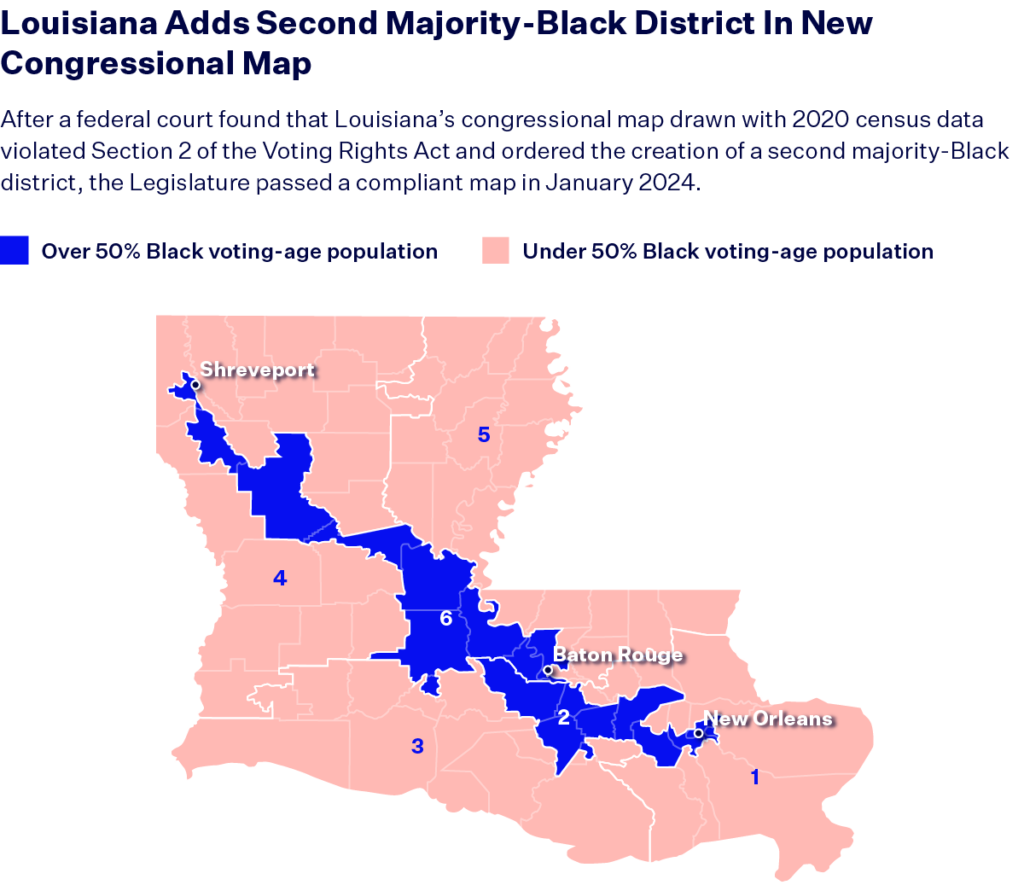Louisiana Legislature Passes Congressional Map With Two Majority-Black Districts
WASHINGTON, D.C. — In a landslide 86-16 vote, the Louisiana House passed a bill that would create a new congressional map, which features two majority-Black districts, after being ordered to do so by a court order.
The map, which passed the Senate on Wednesday, now heads back to the Senate for concurrence before advancing to the desk of Gov. Jeff Landry (R). It is unchanged from the original Senate map as previous tweaks to the map were stripped by the full House earlier today. The map would increase the Black makeup of the state’s 6th Congressional District — stretching from Caddo Parish to East Baton Rouge Parish that is currently held by U.S. Rep Garret Graves (R) — from 23% to 54%, almost certainly taking out the Republican and netting Democrats an additional seat in Congress. The new district would span more than 200 miles in length.

Yesterday, a House committee had tweaked the map after back-door negotiations took place throughout the day. The map still would have created an additional majority-Black district by heavily altering the 6th Congressional District, however the district would have featured a higher portion of Black voters than the previous version, as would the 2nd Congressional District, the state’s other majority-Black district. The other main change would have applied to the East Baton Rouge parish, which would have been split across three congressional districts.
The Louisiana Legislature was thrown into the map drawing process in June 2022 when a federal court struck down the state’s congressional map drawn with 2020 census data for violating Section 2 of the Voting Rights Act by illegally diluting Black voting power, and ordered the creation of a second majority-Black district. The decision had been paused for a year until June 2023, when the U.S. Supreme Court upheld Section 2 in the landmark case out of Alabama, Allen v. Milligan, and also reinstated the order blocking Louisiana’s map. The 5th U.S. Circuit Court of Appeals subsequently set a Jan. 30 deadline for a new map that the Legislature is now working to meet.
Landry has supported the map passed today, as have a wide swath of Republicans in the state. Graves has unsurprisingly spoken out against the proposal, as has Speaker of the House Mike Johnson (R-La.), who slammed the map for the “surrender of a Republican seat in Congress.” Rep. Troy Carter (D-La.), the state’s only Black congress member, has also spoken in favor of the map, saying that he supports “every map that creates two majority-minority districts.”
A special session ordered by Landry is running until Jan. 23 in order for legislators to enact maps. Landry is also asking the Legislature to consider major changes to the state’s Supreme Court map during the special session. If a new congressional map is not adopted by the Jan. 30 deadline, a trial on the existing map will be held in the district court. Similarly, if the plaintiffs — composed of voters and civil rights groups — object to a plan approved by the Legislature, the district court will determine if that map is compliant with the Voting Rights Act.
Get background on the redraw here.
Last updated on Friday, Jan. 19 at 3:32 p.m. EST